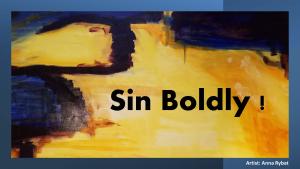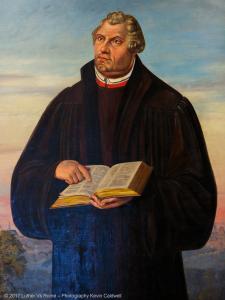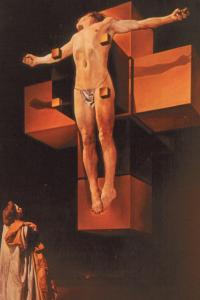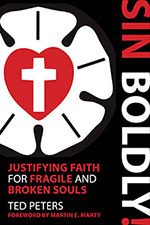For freedom Christ has set us free. Stand firm, therefore, and do not submit again to a yoke of slavery. (Galatians 5:1) [Artist: Anna Rybat)]
 Just what does Christian freedom mean? When Christ has been placed in your heart by the Holy Spirit so that you love your neighbor as God does, you become liberated from your own selfish impediments to authentic loving. Freedom from the self becomes freedom to love others. Now, that’s awesome.
Just what does Christian freedom mean? When Christ has been placed in your heart by the Holy Spirit so that you love your neighbor as God does, you become liberated from your own selfish impediments to authentic loving. Freedom from the self becomes freedom to love others. Now, that’s awesome.
There’s another quirk at work here. It sounds counter-intuitive, but it’s quite important. Once liberated from the self by Christian freedom, you do not need to strive to always be good. You no longer need virtue or perfection or even a good reputation to establish a relationship with God. You’re free of all that.
Now, here’s the quirky implication: you may sin boldly! Did you get that? Sin boldly!
Sin Boldly!
Sin boldly! Really? Yes. To sin boldly means two things. First, relish and enjoy the freedom given you by God’s grace. Second, make moral decisions based on your best judgment. Then, proceed to act. None of your moral judgments will be pure and undefiled. So, proceed to sin boldly!
Grace is the key. If we are justified by God’s grace in our faith, then we do not need to justify ourselves. We do not need to purify ourselves by scapegoating others. We do not need to claim innocence on the grounds that we did nothing rather than risk making a mistake. Why? Because God has already rightwised us–justified us–by grace. Peter Marty’s Reformation sermon on 10.31.2021 helps us grasp this.
Where does “Sin Boldly!” come from?
Where do we get the maxim to sin boldly! It comes from a letter written by Martin Luther (1483-1546) to his younger colleague at Wittenberg University, Philip Melanchthon (1497-1560).
 “If you are a preacher of grace, then preach a true and not a fictitious grace; if grace is true, you must bear a true and not a fictitious sin. God does not save people who are only fictitious sinners. Be a sinner and sin boldly, but believe and rejoice in Christ even more boldly, for he is victorious over sin, death, and the world. As long as we are here [in this world] we have to sin. This life is not the dwelling place of righteousness, but, as [Saint] Peter says, we look for new heavens and a new earth in which righteousness dwells. It is enough that by the riches of God’s glory we have come to know the Lamb that takes away the sin of the world. No sin will separate us from the Lamb, even though we commit fornication and murder a thousand times a day. Do you think that the purchase price that was paid for the redemption of our sins by so great a Lamb is too small? Pray boldly—you too are a mighty sinner.” (Luther 1961-1986, 48: 281-282)
“If you are a preacher of grace, then preach a true and not a fictitious grace; if grace is true, you must bear a true and not a fictitious sin. God does not save people who are only fictitious sinners. Be a sinner and sin boldly, but believe and rejoice in Christ even more boldly, for he is victorious over sin, death, and the world. As long as we are here [in this world] we have to sin. This life is not the dwelling place of righteousness, but, as [Saint] Peter says, we look for new heavens and a new earth in which righteousness dwells. It is enough that by the riches of God’s glory we have come to know the Lamb that takes away the sin of the world. No sin will separate us from the Lamb, even though we commit fornication and murder a thousand times a day. Do you think that the purchase price that was paid for the redemption of our sins by so great a Lamb is too small? Pray boldly—you too are a mighty sinner.” (Luther 1961-1986, 48: 281-282)
Only sinners in this life make moral decisions and take compassionate actions. That describes you and me. That describes every conscientious Christian who is simul justus et peccator, at once both saint and sinner.
Here is my ethical advice. If sinful action is unavoidable, be honest and follow the best path your judgment can set out. Make moral decisions carefully but courageously!
Bondage to the Self
In a Patheos post, “We Are What We Do,” Henry Karlson in the tradition of Maximus the Confessor describes the self that is bound to the self.
The more we establish ourselves in virtue, the more we will experience the world in a way void of the egotistical self, while the more we establish ourselves in and through the enactment of selfish desires, inordinate passions, the more we will create a hermeneutic which interprets the world as good or bad in relation to the way things affirm or hinder our selfish desires. Selfishness, and the pursuit of all the desires we might have through the creation of a selfish, prideful self, leads to delusion and ignorance of the world as it is; this is why such a self must die.
To be liberated from bondage to the self, says Karlson, the self must die.
Daily, say the Protestant Reformers, we should die to our sin and rise with Christ into the life of love.
Freedom in Christ
 The Holy Spirit empowers the self to transcend the self in order to love God for Godself and to love the neighbor for the sake of the neighbor’s self. This is one way that God’s grace manifests itself within our daily life. We experience it as freedom. [Crucifixion by Dali]
The Holy Spirit empowers the self to transcend the self in order to love God for Godself and to love the neighbor for the sake of the neighbor’s self. This is one way that God’s grace manifests itself within our daily life. We experience it as freedom. [Crucifixion by Dali]
“For freedom Christ has set us free. Stand firm, therefore, and do not submit again to a yoke of slavery.” (Galatians 5:1) From what yoke of slavery have we been freed? From enslavement to that little voice whispering, ‘you must be perfect!’ ‘If you sin you will spend eternity in hell’. ‘You must purify yourself by scapegoating others’. ‘If you can’t do it right, then don’t do it at all’. This is freedom from our conscience within our conscience.
Is it time to throw off all moral constraints and live a life of debauchery? No, antinomianism is not what is at stake here. Neither St. Paul nor Martin Luther are removing all restraints on pride or narcissism or concupiscence. Luther has something quite different in mind.
Luther the Reformer recognizes that we find ourselves frequently in moral dilemmas. If we are conscientious and want to pursue the right path, we may find that the right path leads to collateral damage. In some situations of conflict, even no action may yield moral damage. Damned if you do. Damned if you don’t. In such a dilemma, Luther reminds us that grace covers us. Make a decision. Take some action. We will not have to justify ourselves, because we have already been justified by God. Therefore, sin boldly.
PRAYER
Holy Spirit, place the living Christ in our heart; free us from bondage to the self; and inspire us to love our neighbor even if it requires that we sin boldly. Amen.
▓
 Ted Peters is a Lutheran pastor and emeritus seminary professor. He is author of Short Prayers and The Cosmic Self. His one volume systematic theology is now in its 3rd edition, God—The World’s Future (Fortress 2015). He has undertaken a thorough examination of the sin-and-grace dialectic in two works, Sin: Radical Evil in Soul and Society (Eerdmans 1994) and Sin Boldly! (Fortress 2015). Watch for his forthcoming, The Voice of Public Christian Theology (ATF 2022). See his website: TedsTimelyTake.com.
Ted Peters is a Lutheran pastor and emeritus seminary professor. He is author of Short Prayers and The Cosmic Self. His one volume systematic theology is now in its 3rd edition, God—The World’s Future (Fortress 2015). He has undertaken a thorough examination of the sin-and-grace dialectic in two works, Sin: Radical Evil in Soul and Society (Eerdmans 1994) and Sin Boldly! (Fortress 2015). Watch for his forthcoming, The Voice of Public Christian Theology (ATF 2022). See his website: TedsTimelyTake.com.
▓
For more on this topic than you may wish to read, click on our series on sin: (1) Sin? Really? (2) Sin as Self-justification; (3) Sin and the Visible Scapegoat; (4) Sin and the Invisible Scapegoat; plus (5) Sin Boldly!













